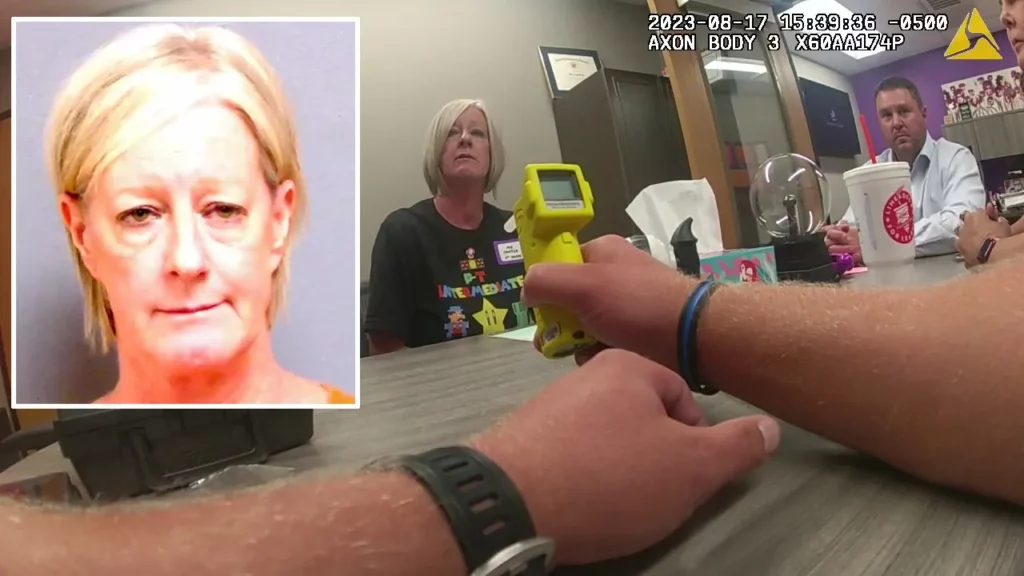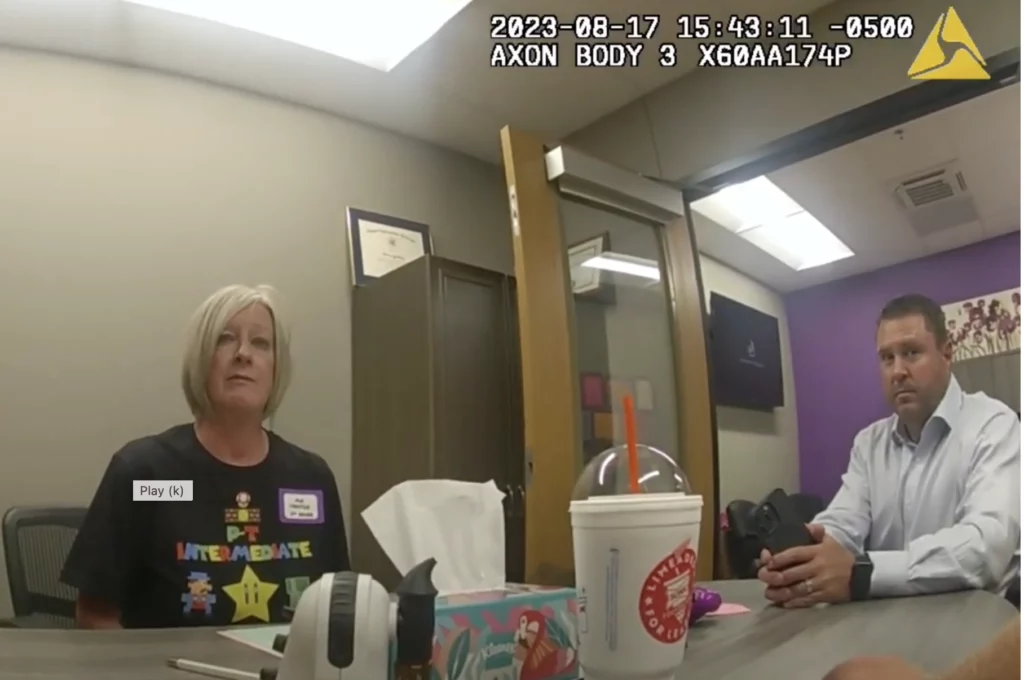The story of Kimberly Coates, a third-grade teacher at Perkins-Tryon School in Oklahoma, has sparked an important conversation about educators’ challenges.
Coates was arrested for allegedly being intoxicated during school hours, highlighting the individual responsibility of teachers and the broader issues they face, including substance abuse and high levels of job stress.
Addressing these issues is essential for maintaining professional standards and promoting the well-being of those responsible for shaping the future of our society.
As we delve deeper into the complexities of addiction and the need for support systems, it becomes apparent that addressing these challenges is crucial for the holistic health of educators.
The Kimberly Coates Incident
 *Photo from Fox News article.
*Photo from Fox News article.
The recent incident involving a third-grade teacher, Kimberly Coates, at Perkins-Tryon School in Oklahoma has brought attention to an important issue in the education sector.3
On the first day of school, Ms. Coates was arrested for allegedly being under the influence while teaching.
Body camera footage showed clear signs of intoxication leading up to her arrest.
Reports indicated that Ms. Coates is facing charges of public intoxication for consuming alcohol before or during school hours.
Superintendent Douglas Ogle noticed her bloodshot eyes and slurred speech, prompting intervention from the Perkins Police Department.
This incident has sparked discussion at both local and national levels, highlighting the importance of maintaining professional standards in educational environments.
The safety and well-being of students rely on competent and stable educators, and swift action by school authorities and law enforcement is crucial in such situations to ensure a safe and trustworthy learning environment.
Understanding Addiction and Alcoholism
Addiction is a complicated and multifaceted disorder that involves compulsive behaviors and continued use of substances or participation in activities, even when harmful consequences occur.
It stems from brain structure and function changes and can significantly impact a person’s ability to control impulses, make decisions, and deal with stress.
Alcoholism is an addiction that specifically involves uncontrolled and compulsive drinking of alcoholic beverages, leading to a physical and psychological dependence on alcohol.
This often results in individuals prioritizing drinking over other activities, even if it causes harm to themselves or others.
Both addiction and alcoholism are chronic conditions that usually require long-term treatment and intervention.
FACTORS CONTRIBUTING TO SUBSTANCE ABUSE
Substance abuse is a complex issue influenced by a combination of biological, psychological, and social factors.
Some individuals may have genetic predispositions that make them more susceptible to addiction.1
Substances can hijack the brain’s reward systems, leading to increased cravings and decreased impulse control.
Psychological factors such as trauma, mental health disorders, and stress can drive individuals to use substances as coping mechanisms, temporarily relieving their internal struggles.
Social factors, including peer pressure, societal norms promoting substance use, accessibility to drugs or alcohol, and lack of support structures, can all contribute to substance abuse.
These factors create a complex web, and each strand can pull an individual closer to addiction.
| Factor Type | Factor | Detailed Description |
|---|---|---|
| Biological | Genetics | Some individuals might have a genetic predisposition that increases their susceptibility to substance abuse. |
| Brain Chemistry | Substance use can alter brain functions, leading to increased dependence due to the altered production and reception of neurotransmitters. | |
| Psychological | Mental Health Disorders | Conditions such as depression, anxiety, or PTSD can increase the risk of substance abuse, as individuals might use substances as a coping mechanism. |
| Early Exposure | Early and frequent exposure to drugs or alcohol during formative years can increase the risk of developing substance use disorders later in life. | |
| Social | Peer Pressure | Being in an environment where substance use is frequent and normalized can increase the likelihood of an individual partaking in similar behaviors. |
| Family Environment | A household where substance use is prevalent or accepted can contribute to an individual developing substance abuse behaviors. |
Prevalence of Addiction and Alcoholism Among Teachers
Reports indicate teachers may be more susceptible to addiction or alcohol-related problems than other professions.2
While the exact percentage may vary, it is estimated that between 4% and 5.5% of education professionals struggle with substance-related issues.
A survey conducted in 2015 found that 4.7% of participants in education reported heavy alcohol consumption in the previous month.
The high-stress levels associated with teaching, including significant occupational pressure, are recognized as contributing factors.
These pressures and other factors may lead some educators to use drugs or alcohol for comfort.
Studies show that the unique challenges teachers face, such as long working hours, limited resources, challenging interactions with students or parents, and the emotional demands of the role, may increase the risk of substance misuse.
However, it is important to clarify that these findings do not suggest that all teachers are susceptible to addiction.
Rather, they highlight that teaching may have a stronger association with substance misuse compared to certain other professions.
Addressing this issue requires further research and increased support mechanisms for educators facing these challenges.
UNDERSTANDING THE IMPORTANCE OF THE ISSUE
Looking more closely, this incident is not a one-time occurrence but highlights educators’ many challenges.
Acknowledging the stressors, difficulties, and possibility of substance abuse within the teaching profession is important.
As members of the education community, it’s our responsibility to create an environment that prioritizes students’ well-being and supports educators’ mental and emotional health.
This event reminds us that we must strengthen support systems, provide early interventions, and foster a safe atmosphere where educators feel comfortable seeking help.
Underlying Causes
| Underlying Cause | Detailed Description |
|---|---|
| Job stress and pressures in the teaching profession | Teachers often face rigorous academic demands, pressure to produce results, and challenges managing diverse classrooms. This persistent stress can make them more susceptible to seeking relief through substances. |
| Emotional burnout and its relationship with substance abuse | Continuous exposure to high stress without adequate coping mechanisms can lead to emotional burnout. When this occurs, substances might be sought as a temporary escape, further elevating the risk of addiction. |
| Societal expectations and the “hidden” nature of addiction among educators | Society often places teachers on a pedestal, expecting them to maintain high moral and ethical standards. This pressure can lead some educators to hide their struggles, making substance abuse a covert coping mechanism. |
| The impact of the COVID-19 pandemic: remote learning, increased workload, and emotional strain | The pandemic introduced new challenges for teachers: mastering remote teaching, managing increased workloads, and handling the emotional strain of navigating an unprecedented educational landscape. This increased strain contributed to heightened stress and potential substance abuse. |
The Role of Stress and Burnout
The teaching profession can be very rewarding but has unique stressors.
Teachers must be responsible for shaping young minds, managing diverse classrooms, dealing with administrative pressures, meeting parental expectations, and often working long hours with limited resources.
Coupled with societal pressure to consistently achieve high educational outcomes and the emotional labor of addressing the varied needs of students, teaching can become a breeding ground for chronic stress.
This constant strain can lead to burnout, which is characterized by physical, emotional, and mental exhaustion and a decreased sense of personal achievement and detachment.
Unfortunately, some educators may turn to substance abuse as a misguided form of self-medication to cope with this overwhelming stress and burnout.4
However, the temporary relief substances offer can lead to a dangerous cycle where relief, dependency, and addiction become blurred.
Work-Related Pressure and Demands
Teachers face a challenging landscape of expectations and demands.
They are expected to deliver educational excellence by various stakeholders, such as parents and administrators, who often judge them using quantifiable metrics.
These high expectations and stringent accountability measures can erode job satisfaction, making educators feel like they are in a pressure cooker rather than a classroom.
Consequently, the constant need to meet or exceed these benchmarks can lead some to seek solace in unhealthy ways.
The mounting stress of consistently performing without adequate coping mechanisms or support might push certain educators towards self-medication with alcohol or drugs, seeking temporary relief from the unyielding demands of their profession.
Coping Mechanisms and Self-Care
When working in high-stress professions, such as teaching, it’s crucial to have healthy coping mechanisms in place.
Coping strategies are essential for managing and reducing the pressures of the job.
However, it’s common for some individuals to turn to unhealthy coping strategies, like substance use, for quick relief.
Although these tactics may provide temporary relief, they often worsen underlying stress, leading to a cycle of dependency and deteriorating overall health.
Prioritizing self-care and adopting healthier coping strategies improves resilience and job satisfaction and protects against the negative effects of harmful habits.
Positive Self-Care Practices for Teachers
As educators play a key role in shaping young minds, they must prioritize their well-being by practicing self-care.
Engaging in regular physical activity, such as taking a brisk walk, practicing yoga, or going to the gym, can help reduce stress and improve mood.
Mindfulness and meditation practices can provide mental clarity and a much-needed break from the demands of the classroom.
Setting boundaries, like creating “tech-free” hours or scheduling time for hobbies, is important to allow educators to recharge.
Seeking professional counseling or joining support groups can provide beneficial insights and coping techniques.
Making healthy nutritional choices is also important, as a balanced diet can support cognitive function and emotional balance.
These practices improve personal well-being and act as a protective barrier against potential pitfalls like addiction.
| Self-Care Practice | Details |
|---|---|
| Physical Activity | Engaging in activities like walking, yoga, or gym sessions can help alleviate stress and boost mood. Regular exercise releases endorphins, which are natural mood elevators. |
| Mindfulness and Meditation | These practices provide mental clarity and offer a break from daily pressures. Meditation, in particular, helps in grounding oneself and being present in the moment, reducing anxiety. |
| Setting Boundaries | Allocating ‘tech-free’ hours or dedicating time to hobbies allows teachers to disconnect and rejuvenate. Creating a separation between work and personal life is essential to reduce burnout. |
| Professional Counseling | Seeking professional guidance or joining support groups can offer coping techniques and an outlet to discuss challenges. It provides a safe space to address any underlying issues. |
| Nutritional Choices | Maintaining a balanced diet supports cognitive function, emotional balance, and overall health. Consuming nutrient-rich foods can enhance energy levels and mood, reducing the need for external stimulants. |
Addressing Isolation and Limited Support
Teaching is often seen as a collaborative profession, but it can actually make educators feel isolated.
Teachers typically spend most of their day in classrooms with their students, separated from their colleagues.
This can lead to feelings of loneliness, especially when they don’t receive enough support from their peers or administrators.
When teachers feel unsupported, it can increase their stress and vulnerability.
That’s why having a strong community and peer support system is essential.
Regular interactions, mentorship programs, and teacher support groups can create a space for shared experiences, advice, and emotional support.
Building these networks can significantly reduce the chances of teachers turning to substances as a coping mechanism.
This highlights the community’s crucial role in preventing and recovering from substance abuse.
Consequences of Addiction and Alcoholism in the Classroom
The problem of substance abuse among educators is a serious issue that affects the entire educational ecosystem.
Teachers who struggle with addiction can experience a significant decline in their ability to teach, leading to poor outcomes for students.
They may lack cognitive sharpness, patience, and energy, and their lessons may lack coherence and enthusiasm.
Additionally, substance abuse can lead to inappropriate behavior and boundary breaches, harming students and damaging trust in the teacher-student relationship.
Substance abuse can also seriously affect the teacher’s health and well-being.
In addition to the immediate risks of substance use, such as alcohol poisoning or drug overdose, long-term substance abuse can lead to chronic health conditions, mental health disorders, and a lower quality of life.
This can create a vicious cycle where stress from teaching leads to substance use as a coping mechanism, further impairing an educator’s ability to handle stress.
The impact of substance abuse extends beyond the teacher and their students, affecting colleagues and the entire school community.
Other educators may need to compensate for a struggling colleague, leading to increased workloads and burnout.
Parents may lose faith in the school’s ability to provide a safe and effective learning environment, and the school’s reputation may suffer, affecting staff morale, student enrollment, and community support.
Recognizing the Signs and Early Intervention
When it comes to education, the health and well-being of both students and teachers are closely intertwined.
That’s why it’s crucial to identify and address signs of substance abuse early on.
These signs may include frequent absences, sudden mood changes, decreased energy, or a noticeable decline in teaching quality and enthusiasm.
Changes in personal appearance, isolation from peers, or erratic behavior may also be warning signs.
Recognizing these signs is not about placing blame but rather about facilitating early intervention.
Supporting affected teachers through resources, counseling, or short breaks can make a significant difference.
Early intervention helps prevent addiction from worsening and ensures that the learning environment remains safe and conducive to learning.
Support Systems and Treatment
To properly address addiction and alcoholism among educators, it’s important to have strong support systems and comprehensive treatment plans in place.
Simply recognizing the issue isn’t enough; a structured pathway to recovery is crucial.
This typically involves a combination of professional counseling, rehabilitation programs, and peer support groups.
Educators benefit from being in environments where they feel understood and where their unique stresses and triggers are acknowledged.
A strong network can offer comfort and guidance during difficult times through colleagues, dedicated helplines, or support groups.
Additionally, institutions should prioritize providing access to these resources without any stigma attached.
Effective treatment involves more than just abstaining from substances; it’s about rebuilding one’s life, rekindling a passion for teaching, and ensuring that educators are holistically supported as they journey towards recovery.
Breaking The Stigma
The teaching profession is often held to a high moral and societal standard.
Unfortunately, addiction and alcoholism can impact educators, leading to stigma and fear of judgment from colleagues, parents, and students.
However, we must break this stigma to promote healing.
Educators in recovery can benefit from open dialogues and support groups where they can share experiences and learn coping strategies without fear of judgment.
These conversations promote understanding and empathy.
Additionally, educational institutions should foster a safe environment where teachers can seek help without fear of professional repercussions.
When educators feel safe to address their struggles, they can take the first steps towards recovery, ultimately improving their lives and the lives of their students.

Amidst all our challenges, there’s an opportunity for positive change.
Each incident helps us identify the areas that need our attention and care.
By working together and being aware, we can create environments that promote the well-being of educators and students alike.
As a community, we must come together to offer support, understanding, and resources to those who need it.
We must empower educators to overcome their struggles and foster hope, resilience, and dedication in every classroom.
It’s time to take action and create a brighter, more supportive future for everyone in the education sector.
If you or a loved one is struggling with Addiction or Alcoholism, please get in touch with us at Cornerstone Healing Center in Scottsdale, AZ.
Our center offers addiction treatment services that concentrate on holistic healing techniques, including addressing the root causes of addiction for long-term recovery.
Let us help you today!








